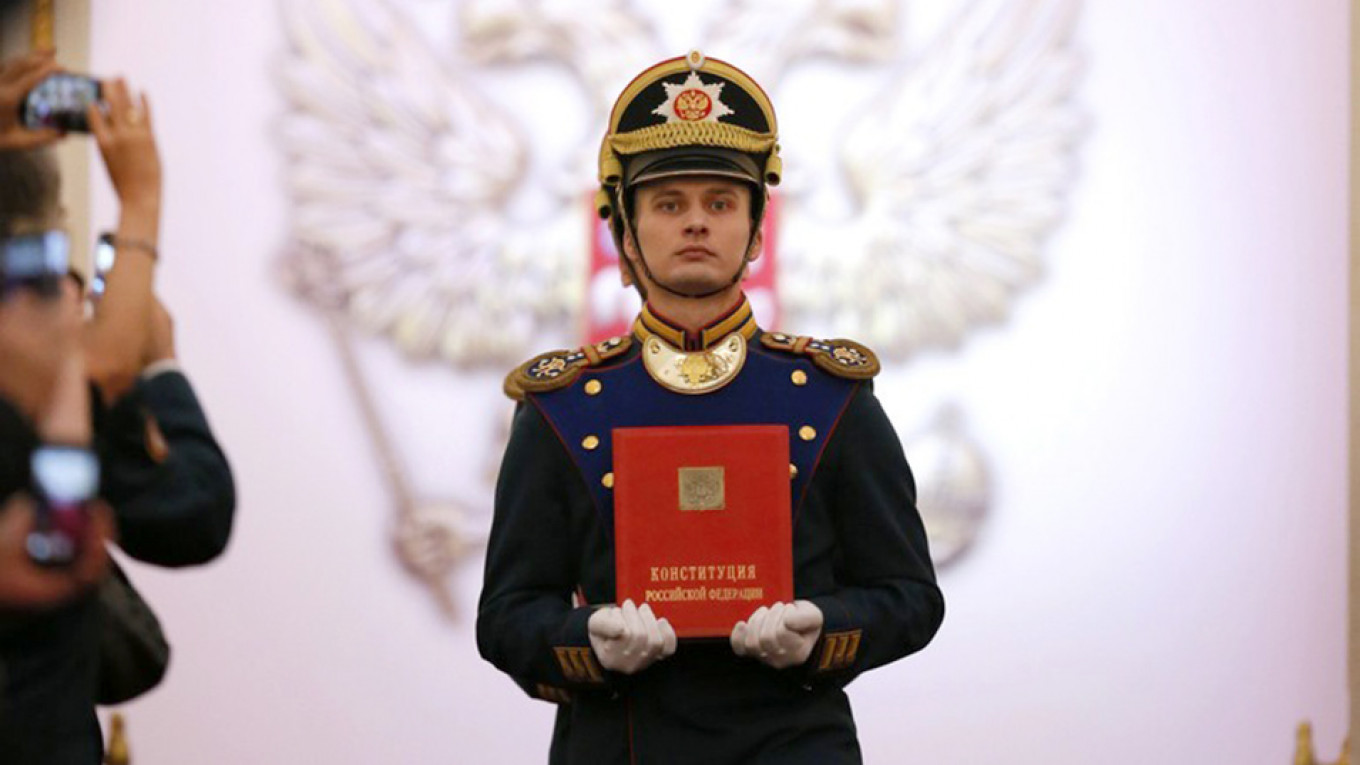
President Vladimir Putin said Thursday he was open to the possibility of altering Russia’s Constitution to limit the number of presidential terms anyone can serve.
“Your humble servant served two terms consecutively, then left his post, but with the constitutional right to return to the post of president again, because these two terms were not consecutive. [This clause] troubles some of our political analysts and public figures. Well, maybe it could be removed,” the president said during his annual end-of-year press conference.
The Constitution currently prohibits anyone from serving as president for more than two consecutive terms, and speculation has swirled over what will happen when Putin’s current term limit runs out in 2024. His statement Thursday prompted heated debate almost instantly.
Some interpreted it as a sign that he plans to extend his rule indefinitely, while others said he meant that he will step down in 2024, when his current term limit ends.
The Moscow Times collected opinions from Russia’s leading political experts:
Yevgeny Minchenko, director at the International Institute for Political Expertise:
— For Putin, the presence or absence of the clause about “consecutive” terms doesn’t matter now.
— I don’t see any connection between what he said about Russia’s Constitution changing and the possible nomination of [Prime Minister] Dmitry Medvedev for the presidency in 2024. There are several missing links between these two things.
— In fact, Vladimir Putin said that he wasn’t considering a new presidential term. However, other scenarios of how he can stay at the helm are still possible. For example, he can return to the government and expand [parliament’s] powers or become the head of a state council.
Tatiana Stanovaya, founder of the political analysis project R.Politik and nonresident scholar at the Carnegie Moscow Center:
— At this point, constitutional changes are inevitable. If Putin remains as president, then the term limits must be amended. If he leaves the presidency, there will be proposals for a different government structure where Putin can find a place in it.
— No one expected Putin to speak out about this so soon — after all, there are still five more years to go in his term. But now the discussion has been started, and the direction this discussion will ultimately go is still unknown.
Andrei Kolesnikov, senior associate and the chair of the Russian Domestic Politics and Political Institutions Program at the Carnegie Moscow Center:
— The easiest scheme is just to change the Constitution. This mechanism has started in a “test” mode. By generally speaking about withdrawing this clause about “consecutive” terms, he may have been referring to lifting the restrictions on himself.
— Even if he formally resigns, nobody believes in a final departure, because Russian citizens have gotten used to living with Putin for two decades — 30 years is no different than 20. The expectations are diminished; there’s a will for change but nobody is holding their breath for it, because Putin is seen as neither a liberal modernizer nor a cruel ruler that instills “order.”
Mikhail Vinogradov, president of the St. Petersburg Political Foundation:
— In 2012, Putin had already said that he wasn’t against the idea of removing this clause from the Constitution. Back then, these words didn’t lead to any actions, so we shouldn’t consider it a big sensation today.
— Technically, in the event this rule is adopted, the restriction would apply only to Medvedev’s third term and Putin’s very hypothetical fifth term in 2030. But in fact, Putin just unintentionally mentioned this topic without saying anything concrete.
Konstantin Kostin, chairman of the Civil Society Development Foundation:
— The president has given two possible ways in which the Constitution can be changed, and for the first time he was quite specific: Redistributing power in favor of parliament and/or removing the consecutive term limit clause. The latter is more of a cosmetic change. This whole discussion, however, is significant because the president has opened up the possibility of discussing changes to the Constitution.
Grigorii Golosov, the head of political science at the European University in St. Petersburg:
— Putin’s statement about removing the word “consecutive” in regards to two presidential terms from the Constitution, in my opinion, insinuates that he will nominate Medvedev for the presidency in 2024. If that happens, Putin will have informal influence and, I’m sure, significant formal authority as well. If Medvedev becomes president, Putin will have significant leverage to preserve power for himself and control Medvedev like he did last time.
